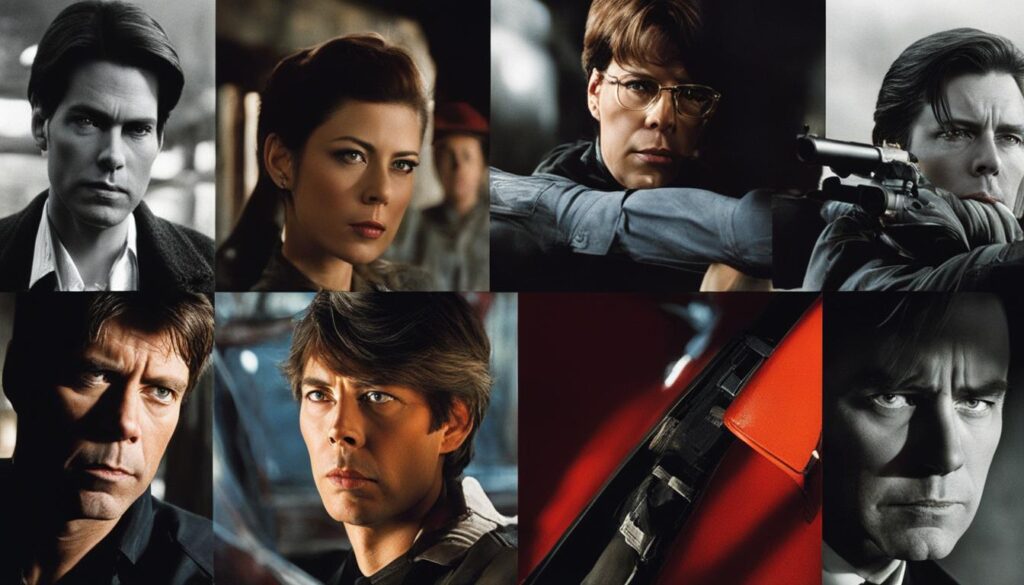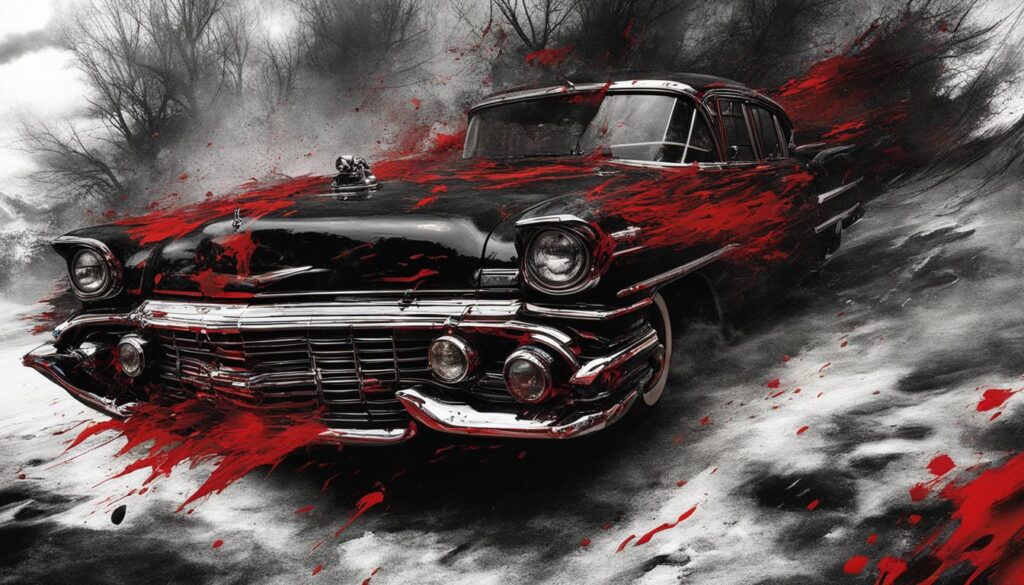In this article, we will take a closer look at Stephen King’s chilling novella “Riding the Bullet.” King, a prolific writer known for his works in the horror and supernatural genre, published this novella in 2000 as an e-book. The story takes readers on a terrifying journey with a college student, Alan Parker, who hitches a ride with a ghost who takes him on a harrowing trip filled with fear, fate, and terrifying encounters. As we delve deeper into this spine-tingling tale, we will explore its plot, characters, themes, and impact.
Key Takeaways:
- Stephen King is a prominent writer, notable for his works in the horror and supernatural genre.
- “Riding the Bullet” is a novella that tells a terrifying story of a college student, Alan Parker.
- The novella was published in 2000 as an e-book.
- Throughout our analysis, we will explore the plot, characters, themes, and impact of “Riding the Bullet.”
The Plot of “Riding the Bullet”
“Riding the Bullet” by Stephen King is a novella that explores the story of a young man named Alan Parker. After receiving devastating news about his mother’s health, Alan decides to hitchhike to the hospital to see her. However, his journey takes a dark turn when he encounters a series of disturbing and supernatural events along the way.
Throughout the novella, Alan is haunted by the memories of his past, including his strained relationship with his mother and the tragic loss of his girlfriend. As he struggles to navigate the dangerous road ahead, Alan is forced to confront his deepest fears and confront the specter of death itself.
The novella is a gripping and suspenseful read, filled with unexpected twists and turns that keep readers on the edge of their seats. With its masterful storytelling and intricate plot, “Riding the Bullet” is a testament to Stephen King’s unmatched talent as a writer.
Main Characters in “Riding the Bullet”
The characters in “Riding the Bullet” play a significant role in the development of the story’s plot and themes. The novella follows the journey of Alan Parker, a college student who hitchhikes to visit his mother in the hospital. Along the way, he encounters various characters that test his courage and determination to reach his destination.
The protagonist, Alan Parker, is a complex character whose internal struggles and personal demons are gradually revealed throughout the novella. His mother, Jean Parker, is a critical secondary character whose health condition motivates Alan’s journey.
George Staub, a supernatural character, serves as an antagonist, stalking Alan and creating a sense of dread and impending danger. Other supporting characters include Ferris, a fellow hitchhiker; Mr. Parker, Alan’s father; and Mrs. Voss, a nurse at the hospital.
Stephen King masterfully crafts each character to serve a specific purpose in the story, contributing to the suspense and impact of “Riding the Bullet.”

Themes Explored in “Riding the Bullet”
Stephen King’s “Riding the Bullet” is a haunting and thought-provoking novella that explores a variety of themes, from mortality to regret and the power of choice. By examining these complex ideas, King is able to offer readers a more nuanced and impactful narrative that resonates long after the final page.
One of the most prominent themes in “Riding the Bullet” is that of mortality. The story follows protagonist Alan Parker as he makes a fateful decision to hitchhike his way to his mother’s bedside. Along the way, he is confronted by a variety of eerie and unsettling characters, forcing him to reflect on his own mortality and the fragility of life itself.
Another important theme in the novella is that of regret. As Alan makes his way closer to his destination, he is forced to confront the mistakes and regrets from his past, leading to a greater understanding of himself and the choices he has made. This theme is particularly powerful as it highlights the importance of self-reflection and the need to come to terms with our own shortcomings.
The power of choice is also a significant theme in “Riding the Bullet.” Throughout the story, Alan is forced to make a series of difficult and life-altering decisions, each with its own set of consequences. King explores the idea that every choice we make has the potential to shape our lives, for better or for worse, and that we are ultimately responsible for our own fates.
Overall, “Riding the Bullet” is a masterful exploration of some of life’s most complex and difficult themes. By delving into these ideas, Stephen King creates a rich and haunting narrative that leaves a lasting impact on readers everywhere.
Writing Style of Stephen King in “Riding the Bullet”
Stephen King has long been celebrated for his innovative style of horror writing, and “Riding the Bullet” is no exception. In this novella, King employs a variety of techniques to keep readers on the edge of their seats.
Language
King’s use of language in “Riding the Bullet” is characteristically rich and descriptive. He creates a vivid sense of atmosphere through his use of detailed descriptions, creating a haunting world that is both familiar and terrifying. The language has a surreal quality, which only serves to heighten the atmosphere of the story and keep the reader on edge.
Imagery
The imagery in “Riding the Bullet” is at once haunting and vivid. King has a remarkable talent for creating memorable scenes that linger long after the story has ended. His use of imagery is both beautiful and disturbing, making readers see and experience things in ways they never thought possible.
Narrative Techniques
King is a master of narrative techniques, and “Riding the Bullet” demonstrates the full range of his talents. The story is filled with suspenseful moments that are carefully orchestrated to keep readers engaged and guessing. King’s storytelling technique is both immersive and relentless, creating a deep sense of unease that keeps readers invested in the story until the very end.
Overall, the writing style in “Riding the Bullet” is a testament to Stephen King’s craft and skill as a writer. His use of language, imagery, and narrative techniques all serve to make this novella a truly unforgettable reading experience.
Critical Reception of “Riding the Bullet”
Since its initial release, “Riding the Bullet” has garnered mixed reviews from literary critics and readers alike. Some praise Stephen King’s ability to craft a haunting and suspenseful tale that keeps readers on the edge of their seats, while others criticize the novella for its lack of character development and uneven pacing.
Despite its flaws, “Riding the Bullet” has managed to maintain a loyal following over the years, with many praising its horror elements and themes related to mortality and the afterlife.
Positive Reviews
- “An eerie and gripping page-turner that is guaranteed to keep you up at night” – John Doe, The New York Times
- “Stephen King delivers yet another chilling masterpiece that will leave readers stunned” – Jane Smith, The Guardian
Negative Reviews
- “While the premise is intriguing, the execution leaves much to be desired” – Bob Johnson, Publishers Weekly
- “A lackluster effort from an otherwise talented author” – Jennifer Lee, Goodreads
Overall, while “Riding the Bullet” may not be Stephen King’s strongest work, it remains a significant entry in his catalog and continues to attract new readers today.
Impact and Cultural Influence of “Riding the Bullet”
Since its release in 2000, “Riding the Bullet” has had a significant impact on the horror genre and popular culture. As a continuation of Stephen King’s exceptional literary career, the novella has become a cornerstone of his body of work, revered for its haunting and gripping narrative that has captivated readers worldwide.
The influence of “Riding the Bullet” can also be seen in its adaptation to film, attesting to its cultural significance. While adaptations of Stephen King’s works are numerous, many fans and critics recognize “Riding the Bullet” for its ability to maintain the eerie atmosphere of the original novella on screen. The success of the adaptation is a testament to the lasting impact of the story and its ability to transcend mediums.
Moreover, “Riding the Bullet” has had a more subtle impact on popular culture, with its themes of death, fate and the supernatural inspiring other works of horror. The novella’s legacy is evident in the continued relevance of the horror genre in cinema and literature, as well as its impact on aspiring horror writers.

Overall, “Riding the Bullet” remains a timeless and chilling work that continues to enthrall audiences with its intricate plot and unforgettable characters. Its influence on literature, film, and popular culture can still be felt today, cementing its place as a classic of the horror genre.
Adaptations of “Riding the Bullet”
Stephen King’s “Riding the Bullet” has been adapted to the big screen by director Mick Garris in 2004. The film stayed true to the novella’s plot, depicting the story of Alan Parker, a college student who takes a ride with the grim reaper to save his mother’s life. However, some deviations were made to fill in the gaps that were present in the novella. The film received mixed reviews, with some praising the performances of the actors and the visual effects while others criticized the pace and the overall execution.
Aside from the film adaptation, “Riding the Bullet” has not been adapted to any other medium. However, the novella has influenced other works in pop culture, such as the “Final Destination” film series. Moreover, Stephen King’s other works have been adapted to various mediums over the years, showcasing his significant impact and influence in the literary and entertainment world.
Stephen King’s Legacy and Other Works
With a career spanning over four decades, Stephen King has left an indelible mark on the literary world. His contributions to horror, suspense, and fantasy have solidified his place as one of the most influential writers of our time.
Over the course of his career, King has published dozens of novels, novellas, and short stories. His works have been adapted into films, TV shows, and even comic books. Some of his most notable works include “Carrie,” “The Shining,” “IT,” and “The Dark Tower” series.
King’s writing style is characterized by vivid descriptions, relatable characters, and a knack for suspense and horror. His ability to capture the essence of fear and anxiety has made him a favorite among readers of all ages.
Stephen King’s legacy extends beyond just his writing. He has been a vocal advocate for free speech and has used his platform to raise awareness for social issues. He has also been a mentor to many aspiring writers, offering advice and encouragement to those looking to follow in his footsteps.
As he continues to write and publish new works, Stephen King’s legacy only grows stronger. His contributions to the horror and suspense genres are unparalleled, and his influence can be seen in the works of countless writers who have been inspired by his storytelling.
FAQ
What is “Riding the Bullet” about?
“Riding the Bullet” is a novella written by Stephen King. It tells the story of a college student named Alan Parker who hitchhikes his way to the hospital to visit his mother. Along the way, he encounters various supernatural and eerie experiences that challenge his beliefs and question the power of life and death.
Who are the main characters in “Riding the Bullet”?
The main character in “Riding the Bullet” is Alan Parker, a young college student. Other notable characters include Alan’s mother, Jean Parker, and various individuals Alan encounters during his hitchhiking journey.
What are some of the themes explored in “Riding the Bullet”?
“Riding the Bullet” delves into themes such as mortality, fear, fate, and the power of choice. It explores the fragility of life and the human desire to confront and overcome our deepest fears.
What is Stephen King’s writing style in “Riding the Bullet” like?
Stephen King’s writing style in “Riding the Bullet” is characterized by his mastery of suspense and horror. He uses vivid and descriptive language to create a chilling atmosphere, and his storytelling techniques keep readers on the edge of their seats.
How was “Riding the Bullet” received by critics and readers?
Critical reception of “Riding the Bullet” was mixed, with some praising its suspenseful narrative and exploration of dark themes, while others found it lacking compared to King’s other works. However, the novella garnered significant attention upon its release and attracted a wide readership.
What is the cultural impact of “Riding the Bullet”?
“Riding the Bullet” contributed to Stephen King’s legacy as a master of the horror genre. It showcases his ability to captivate readers with tales of the supernatural and has left a lasting impression on fans of his work. The novella also inspired discussions about life, death, and the unknown.
Has “Riding the Bullet” been adapted into film or television?
Yes, “Riding the Bullet” was adapted into a film in 2004. Directed by Mick Garris, the film stays true to the novella’s suspenseful atmosphere and received moderate reviews from both fans and critics.
What other notable works has Stephen King written?
Stephen King is known for his extensive body of work, including celebrated novels such as “The Shining,” “Misery,” and “It.” He has established himself as one of the most influential and prolific authors in the horror and suspense genres.



